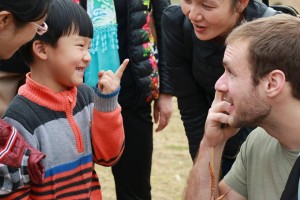As appearing in ALUMLINE
Born and raised in Loveland, Colorado, Bonomo went to CSU in 2006 to study history. Several classes about the Middle East piqued his interest and cemented his love for the history and culture of the region.
His passion for the Middle East was so strong, in fact, that Bonomo left CSU for a semester to study at Birzeit University in Palestine near Ramallah. While there, he was determined to explore West Bank areas of conflict to better understand the civilian experience. “It’s a reference piece – an experience-based perspective – that is missing for a lot of U.S. citizens,” says Bonomo.
The violence he witnessed on one particular day affected him deeply.
Bonomo returned to Colorado. He got a job and resumed his studies at CSU, but something was off. “I didn’t know exactly what was wrong, but I knew that I only laughed at really, really dark humor. I couldn’t connect with old friends, and I wanted to drink almost every night to excess.” He sank into a deep, clinical depression and entertained thoughts of ending his life. His sister urged him to seek therapy.
Shortly after walking into the CSU Health Clinic for the first time, Bonomo met with a counselor and was diagnosed with post-traumatic stress disorder (PTSD).
He began talking with counselors and working through his PTSD. In the process, he addressed long-buried childhood emotional trauma associated with the loss of his father. Bonomo admits, “The therapy dragged out the grittiest parts of my past.” In the end, he was glad to face all of his demons.

“There was always an immense urge to quit therapy,” says Bonomo. “The counselors kept me coming back and working towards sustainable health and happiness. As I went to more therapy sessions, the nightmares faded and joy was found in place after place, more and more often. Beauty and life were crawling back into my existence.”
More than a year into his therapy Bonomo mysteriously stumbled into a sleep-deprived fog. His exhaustion became so all-consuming that he was unable to hold down a job or keep up with his classes, which became a marathon of endurance every day. He reached out again to the CSU Health Network, and was diagnosed and treated for the sleep disorder narcolepsy.
Bonomo describes each CSU Health Network therapist as having a different strength that added to his outlook and coping ability, and who challenged him in new and constructive ways. He credits the CSU Health Network with introducing him to the benefits of caring for both his physical and mental health. “It is not just talking about feelings or the past, but how to be an effective human being with a happy and productive life,” he says. CSU Health Network counselors connected Bonomo to Resources for Disabled Students, local health programs, sleep studies, medical specialists, and even unemployment agencies. “They helped me stay afloat while in school and life, while guiding me to explore how I frame the world.”
Where would Bonomo be today without the support and therapy he received through the CSU Health Network? Possibly trapped in a chronic state of exhaustion. “Probably running in circles looking for purpose in a self-destructive lifestyle that would likely be saturated in depression, co-dependent abusive relationships, and probable suicide,” he says. “They literally saved my life.”
He claims that CSU mental health counselors persistently helped him until he was self-sufficient and solution-oriented, happy and forgiving, and a person capable of surviving tragedy and trauma in healthy ways.
After intense years of therapy and dealing with narcolepsy, Bonomo took a break from CSU to gain more real-world experiences and to strengthen the skills needed to better manage his disorders. He decided to travel abroad again, but this time he deliberately pursued human connection rather than conflict. His work took him to France as a private tutor, and to China where he taught English to more than 900 high school and vocational college students. As a teacher, he became a trusted mentor to struggling students, passing along many coping skills he learned at CSU.
What’s next for Bonomo? He’s back home in Colorado. He completed an Arabic language summer program and was accepted to CSU. He plans to finish his degree in international studies with a focus on the Middle East and North Africa. He may even go after his M.B.A. Instead of seeing trauma-induced nightmares, this Ram sees untapped potential in the Middle East, and he’s driven to be a force for positive change in the region.
What does Bonomo think about the proposed 113,000-s.f. medical center, future home of the CSU Health Network, slated for ground breaking this fall? “I think a new medical center on campus would mean the world to students and mark that the administration is making wise choices to help them succeed. It’s simply the right thing to do.”
Wherever the future alumnus finally lands in life, he plans to use the strategies taught by counselors at the CSU Health Network for years to come. “I deal with issues as they come up without turning to unhealthy coping mechanisms or outside help. I communicate far more effectively. I am better at empathizing. I am a more effective leader and teacher. I am an advocate for veterans’ issues. I have far more confidence, and I help others. What was taught to me has been passed on.”
Bonomo is teaching. He’s smiling again. He’s making a difference. This international studies student has looked trauma in the eye and triumphed in the face of adversity. As he continues to thoughtfully explore the human condition in other cultures, he will share the lessons learned at CSU. And the positive ripples of the CSU Health Network will be felt around the world.
